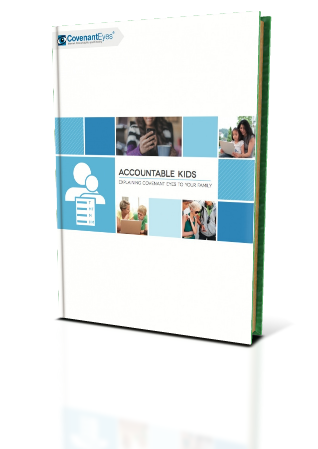When it comes to Internet safety, the early and middle childhood years can seem cut-and-dry for parents: set rules, monitor, block, filter. Easy. But as kids become teenagers, parenting can feel like uncharted waters—especially online.

Two important facts, when mixed, often cause great confusion…
- The Internet is full of dangers and temptations, and the unwise or unprepared teen can’t be expected to navigate those dangers well.
- Teens are growing into full adults, and one of the best ways to prepare them for adulthood is to help them become their own watchdogs, depending less and less on mom and dad to watch their every move.
Where’s the happy medium that accounts for these facts?
Principle #1: Start with dialogue about the online world
First and foremost, children and teens need to understand that privacy is an illusion—in real life, and especially online. Every action you take leaves a digital footprint. Very few things are truly erasable. Even the things that seem like private acts often have social consequences.
- That rude comment made about a classmate might very well be seen by the wrong people.
- That sexy selfie, like it or not, will shape your online reputation.
- No one may know you saw that porn clip, but girl in the clip who was objectified still feels the impact of it.
Your teens need to hear this from you in the context of a dialogue about online life.
Principle #2: Never spy, and don’t just monitor. Hold your kids accountable.
Half of parents of online teens today say they have used parental controls to block, filter, or monitor teen’s online activities. But it’s how you do this that matters most.
Spying only breeds distrust. If you are secretly keeping tabs on your kids online, when it comes time to confront them with embarrassing information, it whittles away at the bond of trust between you and your teenager.
Monitoring is a better solution because teens know upfront that you are watching them. But even then, stopping there is not enough. Dr. Brunilda Nazario says, “Monitoring your teen’s online activities is a poor substitute for parent-child communications.” You don’t want to simply be Big Mother or Big Father.
Instead, hold your kids accountable. Accountability = Monitoring + Conversation. Accountability software can help facilitate this: when you get a weekly report of the websites your teen visits, it serves a reminder that you need to talk to them about any potential red flags.
Principle #3: Help them buy into accountability as a way of life.
Liz Perle, editor in chief for Common Sense Media, says Internet monitoring is a “tricky issue.” While parents can use software to monitor their teens, “at some point, you have to install the software in the kid’s head.”
Parents need to raise their children in an atmosphere of accountability and teach the basic principles about why accountability is so valuable.
- Only the best get accountability. Ask any coach: what players do you ride the hardest? The ones who have the most potential. As kids get older and their superiors want to hold them accountable, they need to learn to see it as a sign of their value: someone thinks I am worth their time to improve how I live.
 Secrecy and the human heart don’t mix well. When we believe no one will know what we do, it is human nature to live selfishly. The more your kids recognize this about themselves, you can appeal to their conscience: “I know you don’t desire to become the kind of person who lives for himself/herself. I know you want to grow into a man/woman who gives sacrificially and serves others well. When we give others permission to watch our back, we can fight that slow drift into selfishness we all have.”
Secrecy and the human heart don’t mix well. When we believe no one will know what we do, it is human nature to live selfishly. The more your kids recognize this about themselves, you can appeal to their conscience: “I know you don’t desire to become the kind of person who lives for himself/herself. I know you want to grow into a man/woman who gives sacrificially and serves others well. When we give others permission to watch our back, we can fight that slow drift into selfishness we all have.”
Need help teaching this? Download a free digital copy of the book Accountable Kids.
DOWNLOAD ACCOUNTABLE KIDSPrinciple #4: Be Goldilocks when it comes to accountability online.
Not too hot. Not too cold. Just right.
Parents who are too hot feel a need to comment on every Facebook message, every Tweet, every Instagram photo, and critique every slightly annoying comment that is posted. Don’t feel the need to be fashion police, being the nosey helicopter parent who is always right around the corner.
Draw a line for yourself: some things your teen does online merely clash with your preferences, but other things clash with your values. Know the difference.
Some parents are too cold, giving kids no rules and complete autonomy online.
Instead, set clear rules for the Internet, but set them with your teen, not just for your teen. Sit down and discuss appropriate use of the Internet: when it is best to get online, what is okay to look at or do, and why it matters. Let your teen take some ownership in the making of the rules.
Be Goldilocks: let them know upfront that you will hold them accountable, but when you need to step in and offer advice, do it in person and do it for the stuff that really matters to your family’s values.
Photo credit: jememay








